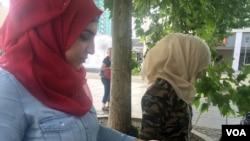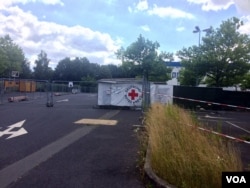“Every week there is a protest against us,” says Shiraz, a 21-year-old Syrian refugee, sitting with his family in a sparkly Dresden marketplace. “But we’ve never been hurt.”
Shiraz pauses, remembering the last demonstration at the camp he lives in about an hour and a-half outside the city. “Well, not every week,” he adds, “but the protests in the next town are definitely every week.”
During demonstrations, refugees stay holed up inside the camp, a converted hotel surrounded by fences and guards.
Despite their caution, German police say there have been more than 550 attacks on refugee residences this year, including arson, gunfire and a grenade. In Dresden, a city that has seen anti-immigrant protests turn violent, refugees say outright assaults are rare, but dirty looks and racist comments remain a staple of daily life.
In 2015—a year in which more than 1 million refugees came to Germany— there were about 1,000 such attacks, five times the number from the year earlier. Since then, far right political parties and groups have flourished, and anger against immigrants does not appear to be abating.
As he was waiting for a train two months ago, Fakhry, a Syrian taxi driver here in Dresden, was kicked in the knee. The man who kicked him proceeded to sip his beer calmly as Fakhry ran away.
“You have to pay attention to everything you do,” says Fakhry as he waits outside a money transfer center for a friend who can translate German to Arabic. “On the other hand, there are nice people who gave us food on the holidays.”
Lingering distrust
At a lush green park, three young Syrian refugees warily eye two slightly older men with pale faces, tattoos and nearly shaved heads.
“Those are the types to be Nazis,” one young man says, softly leaning in. He laughs briefly, recognizing the fact that he is profiling the people he believes to be racists based on their appearance.
Anti-immigration groups in Germany are not members of the now illegal Nazi party from World War II, but activists often label them as such. Even symbolism like swastikas or the Nazi salute are illegal in Germany.
Racist violence, however non-lethal, continues, especially in the eastern countryside, once part of the Soviet bloc.
Late last year, angry locals threw rocks through the windows of his camp in a village outside Dresden, says Mohammad, a 20-year-old Syrian who was a forklift operator before coming to Germany. The group then opened fire, shooting in windows, but no one was harmed.
“Of course everyone was scared,” Mohammad says, poking at his mobile phone. “Everyone jumped.”
There were at least 45 arson attacks on residences of refugees and asylum seekers in the first five months of this year, including one in February, where onlookers cheered while a converted hotel burned.
And anti-immigrant sentiment is sometimes shared by local security guards, some of whom are associated with right-wing political groups, according to Yan St-Pierre of Berlin-based security firm MOSECON.
“Some research indicates that one of the reasons why some of the camps and residences are being attacked so easily is that… they have been accused of inadvertently leaving the door open.”
Psychological strain
At a converted mental hospital in Berlin, Omar, an emergency responder from Damascus, says the dangers for refugees in Germany pales in comparison to the dangers they fled in Syria.
Refugees are less conspicuous in this cosmopolitan city, and the population is generally more liberal than in the countryside, or even other cities. Still, many of the young men here have gotten "the finger" from passersby in recent months, and notice police and local residents keeping a wary eye on them.
Police distrust goes both ways, adds Omar, and he believes while violence against refugees will persist, authorities’ attempts to thwart it also will continue.
“Bad things happen,” he says. “But I don’t think the government will let it be more and more.”
But refugee life is hard by any measure, and for many people who were living ordinary lives at home before the war began, the sadness of being cast as the "hated other" is the most difficult challenge.
“When things go back to normal in Syria,” says Omar, rubbing his head in a barren lobby of the old hospital. “On the very first trip, I will be there.”







